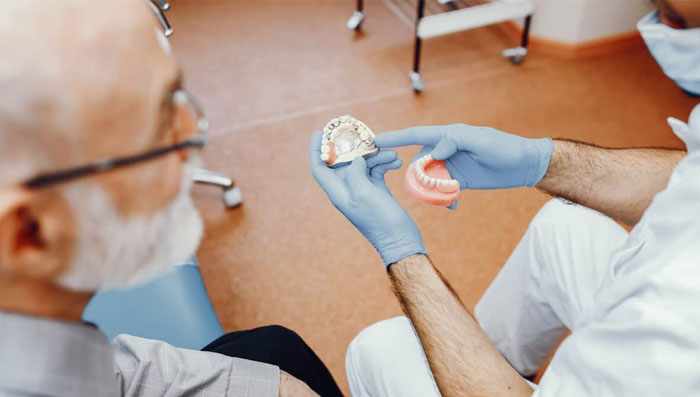Dental Services
Dentures
A removable denture can replace missing teeth and supporting tissues. Learn how your dentist and you can collaborate to ensure that your dentures fit and feel their best.

A removable denture can replace missing teeth and supporting tissues. Learn how your dentist and you can collaborate to ensure that your dentures fit and feel their best.

A removable denture can replace missing teeth and supporting tissues. There are complete and partial dentures available. When all the teeth are missing, complete dentures are used. When some natural teeth are still present, partial dentures are used.
Complete dentures can be “immediate” or “conventional.” A conventional denture is prepared for insertion in the mouth about 8 to 12 weeks after the teeth have been extracted and the gum tissue has started to heal.
Replacement teeth are typically attached to a pink or gum-colored plastic base to create a removable partial denture. The metal framework that connects this base typically keeps the denture in place in the mouth. The partial denture can also be made using materials that do not require a metal framework. Your dentist should be consulted about this option. When one or more natural teeth are still present in the upper jaw or lower jaw, partial dentures are used. By placing crowns on the teeth on either side of the gap and affixing artificial teeth to them, a fixed (permanent) partial denture replaces one or more missing teeth. The “bridge” is then affixed with cement. A partial denture not only fills in the spaces left by missing teeth.
Yes, dental implants can support a bridge that is permanently fixed in place, doing away with the need for a denture. The implants can also be utilized as additional retention for a conventional denture to “snap” into place. Implants and bridges typically cost more but feel more like natural teeth. Dentures are increasingly being replaced by dental implants, but not everyone is a candidate for implants. Ask your dentist for recommendations.
About two months and several appointments are required for the denture development process. The general procedures are as follows once your dentist or prosthodontist (a dentist who focuses on the restoration and replacement of teeth) determines what kind of appliance is best for you:
For a few weeks, new dentures may feel a little strange or loose until your cheek and tongue muscles train to hold them in place and you become accustomed to putting them in and taking them out. Additionally, it is common for minor soreness or irritation to develop, as well as an increase in saliva flow, when you first start wearing dentures, but these issues will go away as your mouth gets used to the new denture.
There shouldn't be any obvious changes to your appearance because dentures are designed to closely resemble your natural teeth. In fact, dentures might make you smile wider and look more youthful.
It will take some getting used to and may be uncomfortable for some wearers for a few weeks to eat with new dentures. Start with soft foods cut into small pieces or thin strips rather than a small chunk to help you get used to the new denture. Utilizing both sides of your mouth, chew slowly. Add additional foods as you adjust to your new dentures until you resume your regular diet. With hot or hard foods as well as sharp-edged bones or shells, exercise caution. Additionally, stay away from extremely hard or sticky foods. Avoid chewing gum. Additionally, avoid using toothpicks when wearing dentures.
You might have trouble pronouncing some words. If so, practice speaking the challenging words aloud. You'll be able to say those challenging words more fluidly with time and practice.
Call your dentist if your dentures “click” while you're speaking. When you laugh, cough, or smile, your dentures might occasionally fall out. By gently biting down and swallowing, you can realign the dentures. Call your dentist or prosthodontist if any speech issues persist.
You'll be instructed by your dentist or prosthodontist on how long to wear your denture for and when to take it out. You might be instructed to wear your denture constantly during the first few days after receiving it, even while you sleep. With immediate dentures, this is typically the case.
Even though it might feel uncomfortable at first, this is the quickest way to find the parts of your denture that might need adjusting. After corrections are made, take your denture out before retiring for the night. As a result, saliva and the tongue can stimulate and clean the gum tissues as usual. After a thorough cleaning, you can reinstall your denture in your mouth the following morning.
A denture adhesive may be considered under the following circumstances: